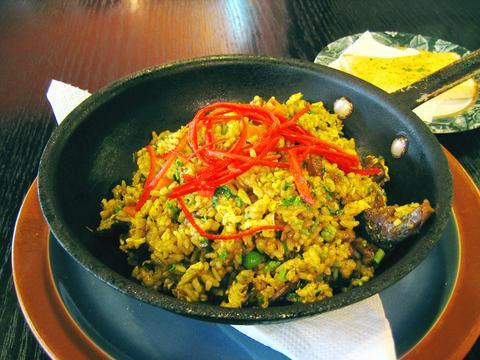Indian Fans and its predictably kitsch wall hangings and assorted nick-knacks related to India first appeared on Taipei's fashionable Yungkang food-street two years ago. It opened a second outlet a stone's throw from the more up-market Dinghao shopping neighborhood last summer.
The place must be doing something right in order to open its second branch, but what that is leaves this reviewer perplexed. Like all too many locally owned restaurants that attempt to pass themselves off as foreign eateries and fall flat, if not so low that the gutter is the best place for them, Indian Fans is a sham.
While some bright spark had the affront to boast "best Indian curry in Taipei" on a flyer advertising the place at the recent Computex in Taipei, the truth is very different. Indian Fans serves up some of the worst curry to be found in Taipei. Sure, the decor and design are pleasant enough, but this is an eatery not a museum piece.

PHOTO: GAVIN PHIPPS, TAIPEI TIMES
The menu includes such fancy sounding fare as Kashmir chicken curry, Madras beef curry, Rajasthan mutton curry and Punjab mixed vegetable curry, but there's not a naan bread in sight. Each dish is served with a plate of rice -- the local sticky variety as opposed to the fluffy Indian type -- an odd assortment of vegetables, and comes with a complementary salad bar.
This reviewer sat down for what he thought would be a lamb pulao (NT$249), but was instead served a wok-fried plate of lamb fried rice filled with frozen carrots, peas and, of course, the ubiquitous corn. While I attempted to wade through the fried rice and accompanying grease and at the same time discern its flavor, a waitress was kind enough to pop a side dish of garlic bread made from a single slice of white toasted bread on the table.
Sadly the food's flavorlessness and the limp slice of garlic bread proved all too much and I was forced to beat an early retreat from Indian Fans with my meal left unfinished.
I opted for my complementary beverage to go, but should have declined the cup of iced Indian Masala tea as it proved as bad as the meal. Traditionally drunk as a pick-me-up, the bastardized version of this otherwise great brew served up at Indian Fans had the reverse effect. Instead of leaving me refreshed it left a rancid taste in my mouth.
The bottom line for Indian Fans is simple: If you're familiar with and enjoy Indian fare then don't go anywhere near the place!

Taiwan has next to no political engagement in Myanmar, either with the ruling military junta nor the dozens of armed groups who’ve in the last five years taken over around two-thirds of the nation’s territory in a sprawling, patchwork civil war. But early last month, the leader of one relatively minor Burmese revolutionary faction, General Nerdah Bomya, who is also an alleged war criminal, made a low key visit to Taipei, where he met with a member of President William Lai’s (賴清德) staff, a retired Taiwanese military official and several academics. “I feel like Taiwan is a good example of

March 2 to March 8 Gunfire rang out along the shore of the frontline island of Lieyu (烈嶼) on a foggy afternoon on March 7, 1987. By the time it was over, about 20 unarmed Vietnamese refugees — men, women, elderly and children — were dead. They were hastily buried, followed by decades of silence. Months later, opposition politicians and journalists tried to uncover what had happened, but conflicting accounts only deepened the confusion. One version suggested that government troops had mistakenly killed their own operatives attempting to return home from Vietnam. The military maintained that the

Before the last section of the round-the-island railway was electrified, one old blue train still chugged back and forth between Pingtung County’s Fangliao (枋寮) and Taitung (台東) stations once a day. It was so slow, was so hot (it had no air conditioning) and covered such a short distance, that the low fare still failed to attract many riders. This relic of the past was finally retired when the South Link Line was fully electrified on Dec. 23, 2020. A wave of nostalgia surrounded the termination of the Ordinary Train service, as these train carriages had been in use for decades

Lori Sepich smoked for years and sometimes skipped taking her blood pressure medicine. But she never thought she’d have a heart attack. The possibility “just wasn’t registering with me,” said the 64-year-old from Memphis, Tennessee, who suffered two of them 13 years apart. She’s far from alone. More than 60 million women in the US live with cardiovascular disease, which includes heart disease as well as stroke, heart failure and atrial fibrillation. And despite the myth that heart attacks mostly strike men, women are vulnerable too. Overall in the US, 1 in 5 women dies of cardiovascular disease each year, 37,000 of them